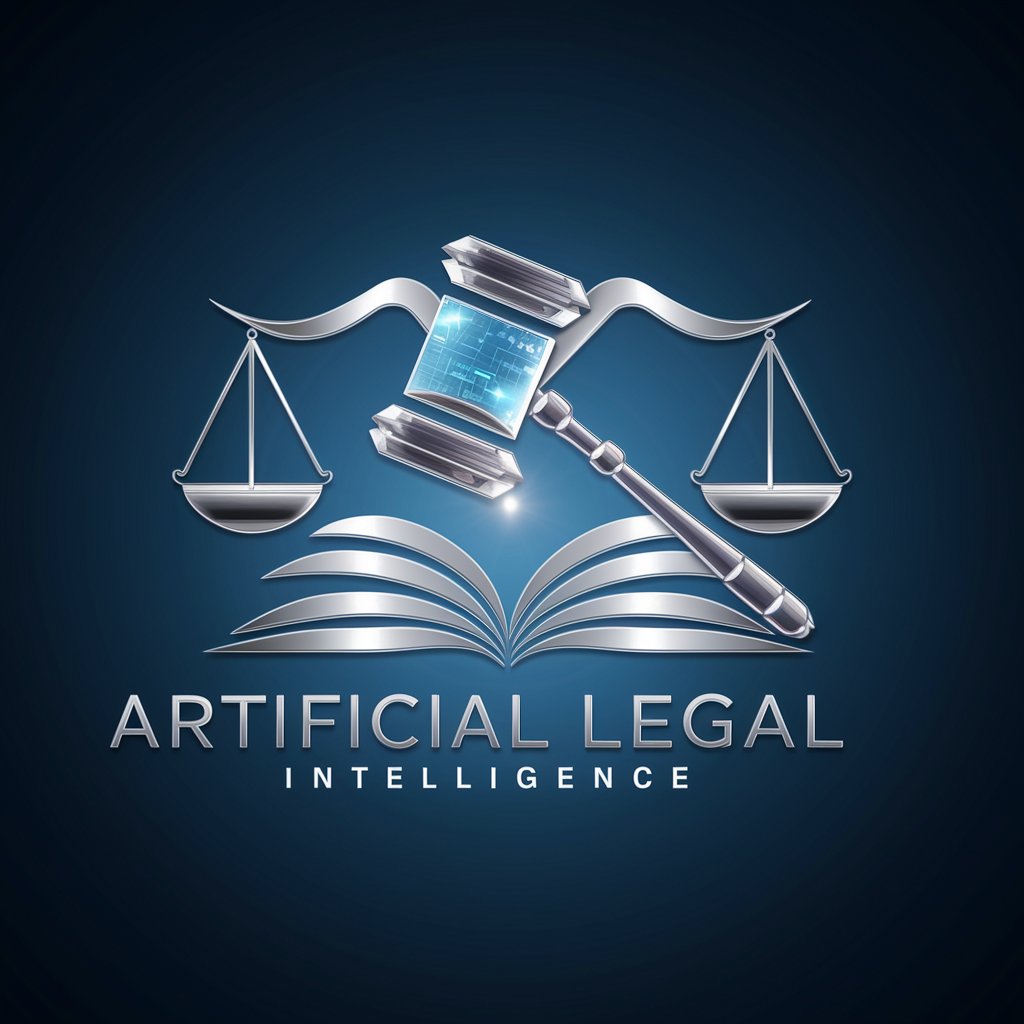Artificial Legal Intelligence - Legal AI Assistance

Welcome to Artificial Legal Intelligence.
Empower Your Legal Practice with AI
Can you tell me about the features of your service?
What are the benefits of using this AI legal assistant?
How does Artificial Legal Intelligence ensure data security?
What makes this AI different from other legal technologies?
Get Embed Code
Introduction to Artificial Legal Intelligence
Artificial Legal Intelligence is designed to provide comprehensive legal assistance by leveraging advanced artificial intelligence technologies. Its primary purpose is to augment legal research, analysis, and decision-making processes, making them more efficient and accurate. This technology is capable of processing vast amounts of legal data, including case law, statutes, legal precedents, and regulations, to deliver precise legal advice, predict legal outcomes, and automate routine legal tasks. For example, in contract analysis, Artificial Legal Intelligence can quickly review and identify potential issues within contracts, such as non-compliance with laws or missing clauses, thereby saving time and reducing the risk of legal disputes. Powered by ChatGPT-4o。

Main Functions of Artificial Legal Intelligence
Legal Research
Example
Automatically compiling relevant case laws and statutes for a specific legal issue.
Scenario
A lawyer working on a complex copyright infringement case uses Artificial Legal Intelligence to gather and analyze all relevant precedents and current laws within minutes, which would traditionally take days.
Document Analysis
Example
Reviewing and summarizing key points from legal documents.
Scenario
A corporate legal department uses Artificial Legal Intelligence to review hundreds of contracts during due diligence in an M&A transaction, identifying clauses that require renegotiation.
Predictive Analytics
Example
Predicting the outcome of legal cases based on historical data.
Scenario
Before proceeding to trial, a law firm uses Artificial Legal Intelligence to assess the likelihood of winning a case by analyzing outcomes of similar cases, helping them to advise their client on whether to settle or proceed.
Compliance Monitoring
Example
Tracking and ensuring compliance with applicable laws and regulations.
Scenario
A financial institution employs Artificial Legal Intelligence to continuously monitor and report on compliance with evolving financial regulations, significantly reducing the risk of non-compliance penalties.
Ideal Users of Artificial Legal Intelligence Services
Law Firms
Law firms benefit from Artificial Legal Intelligence by streamlining case preparation, legal research, and document analysis, enabling lawyers to focus on strategy and client interaction.
Corporate Legal Departments
In-house legal teams in corporations use Artificial Legal Intelligence to manage contracts, ensure regulatory compliance, and efficiently handle legal disputes, thereby reducing legal costs and enhancing operational efficiency.
Government Agencies
Regulatory bodies and government legal departments use Artificial Legal Intelligence for legislative drafting, policy analysis, and ensuring compliance with legal standards, improving governance and public service delivery.
Legal Tech Companies
Companies developing legal technologies incorporate Artificial Legal Intelligence to create innovative legal products and services, such as automated legal advice platforms, enhancing accessibility to legal services.
Academics and Researchers
Legal scholars and researchers utilize Artificial Legal Intelligence for legal analytics, researching legal trends, and testing theories, contributing to the advancement of legal scholarship.

How to Use Artificial Legal Intelligence
1
Navigate to yeschat.ai for a complimentary trial, no sign-up or ChatGPT Plus required.
2
Choose a legal question or document you need assistance with, such as drafting contracts, legal research, or case analysis.
3
Input your query or upload your document into the system. Use clear, specific language for the best results.
4
Review the generated response. For complex inquiries, consider refining your question or providing additional context.
5
Apply the provided information within your legal practice, ensuring to verify the accuracy and relevance according to current laws.
Try other advanced and practical GPTs
Backcasting with Future Visioneer
Envisioning Tomorrow, Planning Today

Logo Generator
Craft Your Identity with AI Creativity

Global Seller Navigator 电商出海小舵手
Navigate Global E-commerce with AI-Powered Precision

Creador de Personajes Virtuales
Craft Your Characters with AI

LLMermaid Interpreter - saysay.ai
Empowering Creativity and Efficiency with AI

Thai Kitchen Guru
Authentic Thai Cooking at Your Fingertips

梦的解析
Visualize and Interpret Your Dreams with AI

CannaGpt's
AI-powered Cannabis Cultivation Companion

Learn AI
Empowering Insights with AI

Car Insurance Saver
AI-powered Car Insurance Advisor

Coach de carriere
Empowering Your Career Journey with AI

German is easy
Master German with AI-Powered Assistance

Frequently Asked Questions about Artificial Legal Intelligence
What types of legal tasks can Artificial Legal Intelligence assist with?
Artificial Legal Intelligence can assist with a wide range of tasks, including legal research, contract review and drafting, case law analysis, and preparation of legal briefs.
Is Artificial Legal Intelligence a substitute for a human lawyer?
While it significantly enhances efficiency and accuracy in legal tasks, it is not a substitute for the nuanced judgment and expertise of a human lawyer, especially in complex legal scenarios.
How does Artificial Legal Intelligence stay updated with current laws?
The system is regularly updated with the latest legal databases and uses advanced algorithms to understand and apply current laws and legal precedents.
Can I use Artificial Legal Intelligence for sensitive or confidential legal matters?
Yes, it is designed with robust security measures to handle sensitive information. However, it's crucial to ensure that its use complies with confidentiality and privacy laws applicable to your jurisdiction.
What makes Artificial Legal Intelligence stand out from other legal tech tools?
Its ability to process and analyze large volumes of legal data quickly, providing precise, relevant legal information and draft documents, sets it apart. Additionally, its user-friendly interface and adaptability to various legal tasks offer unparalleled convenience and efficiency.
